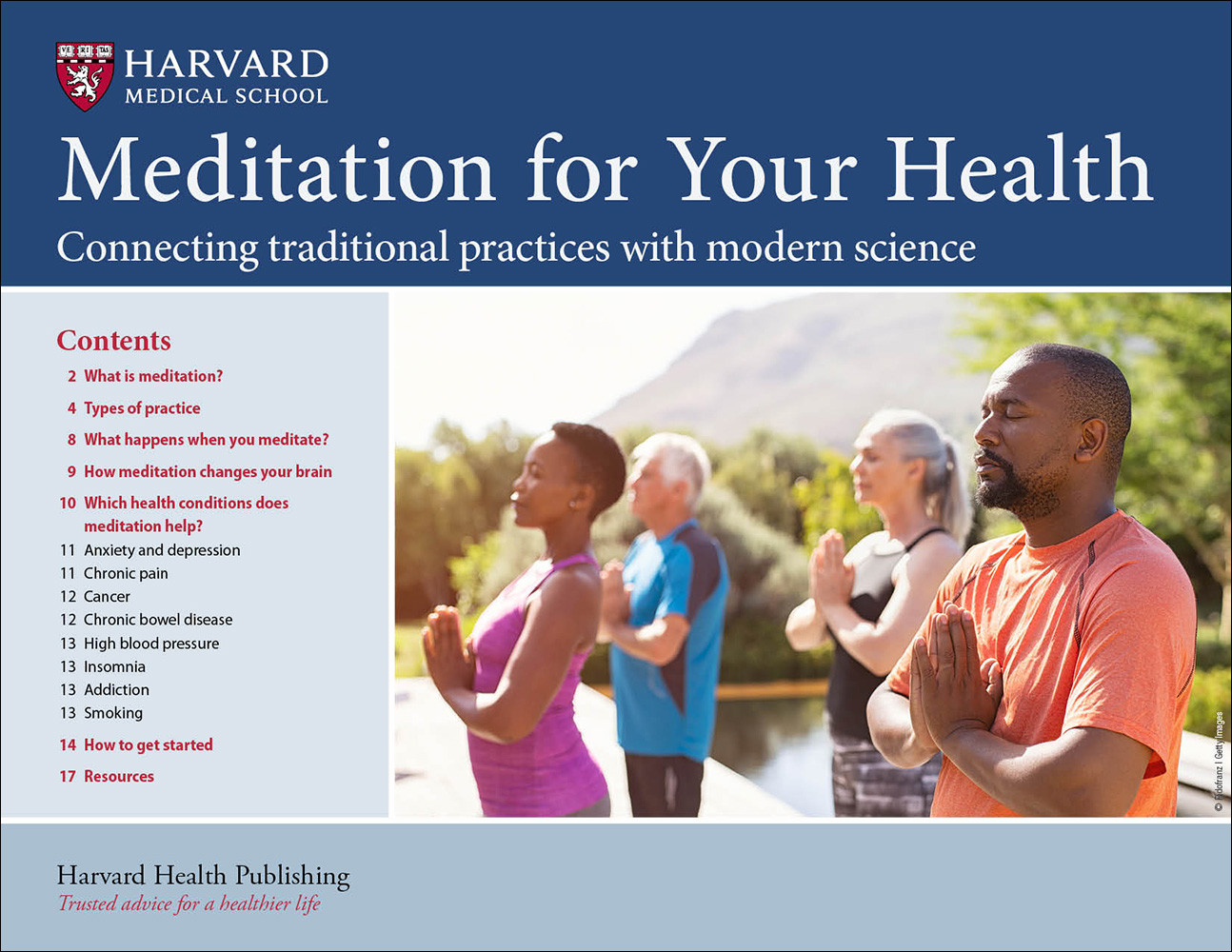Recent Articles

Medicare versus Medicaid: Key differences

Lost a tooth? What to know about dental implants

Hyperbaric oxygen therapy: Evidence-based uses and unproven claims

Gatorade. Liquid IV. Do you need extra electrolytes?

Sexual violence can cast a long shadow on health

Prostate cancer: Short-course radiation just as effective as longer-term treatments

Eggs, protein, and cholesterol: How to make eggs part of a heart-healthy diet

Can a quick snooze help with energy and focus? The science behind power naps

Autism: The challenges and opportunities of an adult diagnosis

Hospice care: Overview of a compassionate approach to end-of-life care


Meditation for Your Health
This guide will cover some of the many different approaches to the practice, explain how meditation activates various parts of the brain, and explore the different medical conditions it might help. Then we will guide you, step by step, through the processes you can use to calm your mind and breath, so that you can get started incorporating meditation into your daily life.
Other Product Information
New research is finding meditation useful for a variety of health problems—including easing chronic pain… reducing gastrointestinal symptoms… and lowering blood pressure and stress to protect the heart!
With regular practice, meditation can also help you gain a deeper awareness of your inner self. There is even some evidence that meditation changes your brain—enlarging areas of brain tissue that help us think and learn… while decreasing areas that cause us stress and anxiety.
Have you meditated today? It’s super simple with the right guidance…
With Harvard Medical School’s special report—Meditation For Your Health—you’ll get all the facts… the latest findings… and the science-backed meditation techniques to apply the healing powers of this ancient practice in your life! Sit down. Close your eyes. Breathe in and out…
Can it really be that simple?
YES! When Harvard Medical School professor, Dr. Herbert Benson, first discovered that centering the mind induced a unique state of calm, called the “relaxation response”.... no one could have predicted just how powerful entering this state of relaxation could be. In fact, studies showed that both heart rate and blood pressure were reduced in people who meditated!
In the field of neuroscience—researchers Antoine Lutz and Richard Davidson found patterns of electrical activity in the brains of longtime meditators differed significantly from those of other study participants… which means, meditation could induce real, measurable changes in the brain!
Order Harvard Medical School’s easy-to-read guide: Meditation For Your Health — where you’ll get everything you need to start reaping the rewards of this ancient healing practice:
- The four types of meditation backed by science
- Exactly how meditation activates various parts of the brain
- Which medical conditions meditation can help
- A STEP-BY-STEP breakdown of how to calm your mind and breath… so that you can start incorporating meditation into your daily life!
- And so much more!
There is no better time to start your practice! Especially now as new research findings continue to highlight the health benefits of regular meditation, including improvements in cardiovascular health, anxiety, depression, gastrointestinal conditions, and insomnia.
Pretty cool, right? That’s why meditation should be at the top of your list alongside exercising, eating well, and sleeping… if you want to stay in tip top shape as you age!
Order this Special Health Guide today and discover everything you need to know to reap the health benefits of meditation.
Prepared by the editors of Harvard Health Publishing in consultation with Darshan Hemendra Mehta, MD, MPH, Medical Director, Benson-Henry Institute for Mind Body Medicine at Massachusetts General Hospital, Education Director, Osher Center for Integrative Medicine at Brigham and Women’s Hospital, Assistant Professor of Medicine, Harvard Medical School, and Director, Office for Well-Being, Massachusetts General Hospital. (2021)
About Harvard Medical School Guides
Harvard Medical School Guides delivers compact, practical information on important health concerns. These publications are smaller in scope than our Special Health Reports, but they are written in the same clear, easy-to-understand language, and they provide the authoritative health advice you expect from Harvard Health Publishing.
- What is meditation?
- Types of practice
- What happens when you meditate?
- How meditation changes your brain
- Which health conditions does meditation help?
- Anxiety and depression
- Chronic pain
- Cancer
- Chronic bowel disease
- High blood pressure
- Insomnia
- Addiction
- Smoking
- How to get started
- Resources
Recent Articles

Medicare versus Medicaid: Key differences

Lost a tooth? What to know about dental implants

Hyperbaric oxygen therapy: Evidence-based uses and unproven claims

Gatorade. Liquid IV. Do you need extra electrolytes?

Sexual violence can cast a long shadow on health

Prostate cancer: Short-course radiation just as effective as longer-term treatments

Eggs, protein, and cholesterol: How to make eggs part of a heart-healthy diet

Can a quick snooze help with energy and focus? The science behind power naps

Autism: The challenges and opportunities of an adult diagnosis

Hospice care: Overview of a compassionate approach to end-of-life care
Free Healthbeat Signup
Get the latest in health news delivered to your inbox!
Sign Up

